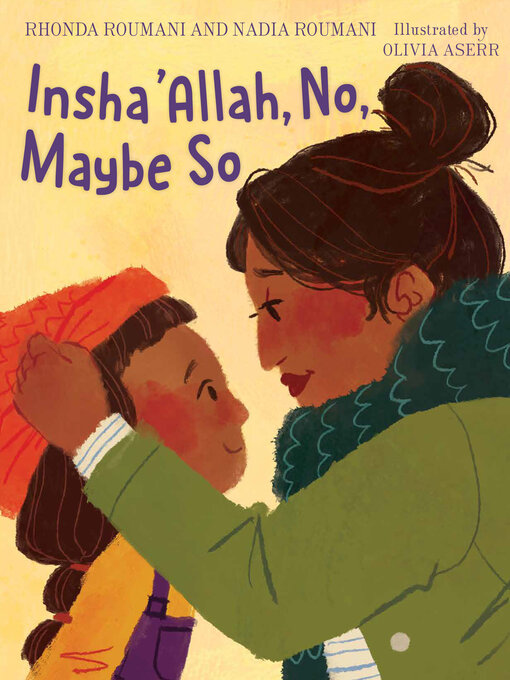Ranya wants to go to the park. “Insha’Allah,” her mom tells her.
But doesn't that just mean no? Ranya's mom says “Insha’Allah” when Ranya asks to make cookies. She says it when Ranya wants to sleep over at Jayda's house. She says it when Ranya begs to go to Disneyland.
This might sound familiar to parents and caregivers . . . It’s hard to know what to say when you can’t promise anything! Sometimes grown-ups say “Maybe” or “We’ll see.” And in millions of Arab and Muslim homes around the world, families use the phrase “Insha’Allah” when talking about the future.
So, what does “Insha’Allah” really mean? In this warmly illustrated picture book, Ranya and her mom tackle the meaning of the powerful phrase and ponder the best way to talk about their hopes and dreams—and maybe, sometimes, the things they want to put off. (Like cleaning up toys!)
Cozy art and joyful, loving characters make this a perfect family read aloud.
A Junior Library Guild Gold Standard Selection
A New York Public Library Best Book of the Year!
-
Creators
-
Publisher
-
Release date
May 14, 2024 -
Formats
-
Kindle Book
-
OverDrive Read
- ISBN: 9780823459216
-
-
Languages
- English
-
Reviews
-
Kirkus
April 1, 2024
A young girl is upset when her mother defers her promises. When Ranya asks her mother if they can go to the park, Mama replies, "Insha'Allah." Ranya fumes--that's what her parents always say when they mean no! Mama explains that the sky's looking overcast and adds that "insha'Allah" means "God willing." People say it when they hope for something that they aren't sure will happen: "Sometimes Allah has other plans." Ranya pries a little more: Is that why they didn't bake cookies last night? And why her sleepover with her friend Jayda fell through? And why her parents have never taken her to Disneyland? Mama replies that it was getting too late to bake and that Jayda's grandmother became sick, but she promises to take Ranya to Disneyland before she turns 18...insha'Allah. Ranya negotiates with her mother, who agrees that they can bake cookies later and Ranya can plan another sleepover. Mama notices the weather has improved and says they can go to the park. But first, she asks Ranya to clean up her toys. Ranya impishly replies, "Insha'Allah!" This is a sweet introduction to an expression often used in Muslim and Arabic-speaking communities. The playful banter between mother and daughter forms the heart of the story. Ranya and Mama are illustrated with warm brown skin tones; theirs is a diverse neighborhood. Homey illustrations in bold primary colors create a sense of coziness. Lively, funny, and child-friendly. (authors' note) (Picture book. 4-8)COPYRIGHT(2024) Kirkus Reviews, ALL RIGHTS RESERVED.
-
Publisher's Weekly
May 6, 2024
Ranya responds with frustration after her mother answers “insha’Allah” to multiple asks; “You said insha’Allah, and that means no!” But her mother reassures her that the term means, instead, “God willing.” As Ranya asks further questions, her mom explains that the word has many connotations: “We say it when we want something to happen, but we don’t know if it will,” as well as “because sometimes things happen that we can’t control” and “to talk about our hopes and dreams.” After her mother agrees to stop using the phrase “when I really want to say no, or when I don’t have an answer,” Ranya again takes up the original asks. Mom does her best, but Ranya has the last word—insha’Allah—in the Roumanis’ warm, playful introduction to a term used by Muslims
and Arabic-speaking people globally. Aserr’s digital and watercolor illustrations focus on domestic and neighborhood scenes that foreground the brown-skinned duo. An author’s note concludes. Background characters are portrayed with various skin tones. Ages 3–7. -
School Library Journal
December 6, 2024
Gr 2-4-A young girl named Ranya makes a variety of requests to her busy mother: she wants to go to the park, she wants to bake cookies, she wants to have a sleepover. Mom often responds, "Insha'Allah," which Ranya interprets as a firm "no." Mom patiently explains to Ranya that it really means "God willing." It isn't a no, it isn't a yes, and it isn't a maybe. It is nuanced, and something else entirely. Lush colors and a variety of body types are depicted. The mother is shown as wide hipped and stylish, a pleasant contrast to the thin body types prevalent in contemporary picture books. Back matter provides additional insight into this versatile Arabic phrase. Vibrant digital art is set against eye-pleasing watercolor backgrounds. Aserr, a background painter at Disney, is adept at showing many facial expressions, and her characters appear to move across the page. VERDICT Relatable to any child, regardless of religion, who is trying to navigate a world of grown-up nuance. A valuable window and mirror for readers.-Chance Lee Joyner
Copyright 2024 School Library Journal, LLC Used with permission.
-
subjects
Languages
- English
Loading
Why is availability limited?
×Availability can change throughout the month based on the library's budget. You can still place a hold on the title, and your hold will be automatically filled as soon as the title is available again.
The Kindle Book format for this title is not supported on:
×- - Kindle 1
- - Kindle 2
- - Kindle DX
- - Kindle Keyboard
- - Kindle 4
- - Kindle Touch
- - Kindle 5
- - Kindle Paperwhite
- - Kindle 7
- - Kindle Voyage
Read-along ebook
×The OverDrive Read format of this ebook has professional narration that plays while you read in your browser. Learn more here.



